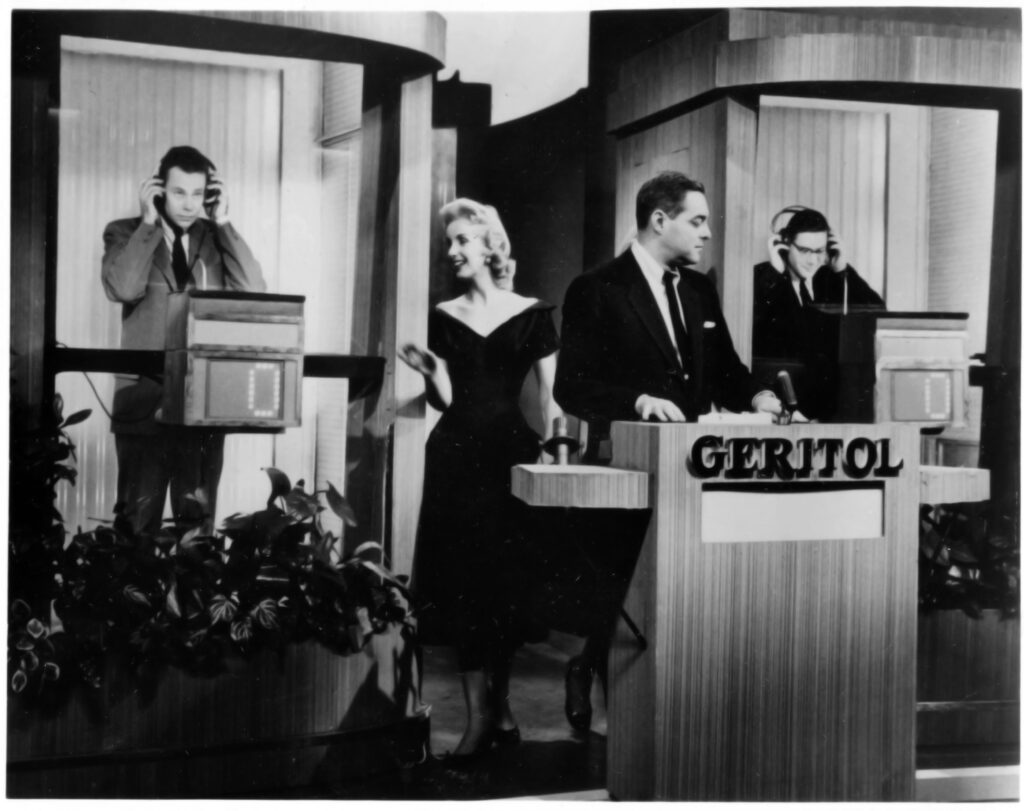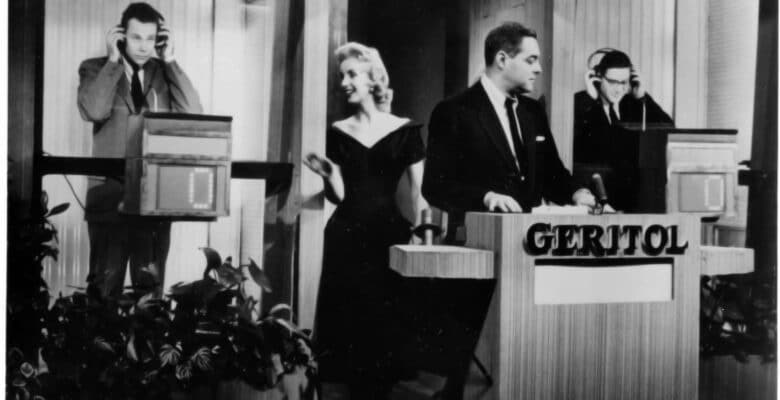By Adam Nedeff, researcher for the National Archives of Game Show History, and Howard Blumenthal, co-founder of the National Archives of Game Show History
On September 16, film lovers mourned the loss Robert Redford, star of The Sting, Butch Cassidy & The Sundance Kid, All the President’s Men, and many other popular movies. For game show fans, the name Robert Redford is connected with one film where he never stepped in front of the camera: he directed 1994’s Quiz Show, a dramatic retelling of the 1950s quiz show scandal.
The scandal involved the producers of several game shows effectively rigging the outcomes, and claiming that the shows were not rigged. One of these shows was NBC’s Twenty One. Herb Stempel had been winning games and had become a champion, but Twenty One executive producer Dan Enright told him to lose to a handsome, charismatic newcomer named Charles Van Doren. Apparently, Enright promised Stempel a slot as a panelist on a new series in development, but Enright didn’t keep his promise, and Stempel blew the whistle. Unfortunately, nobody seemed to care. Not much happened until another contestant on another popular show called Dotto went public with a similar claim. This led to investigations, a Grand Jury, Congressional hearings, cancellation of many game shows, and federal regulations to prevent rigging in the future.

More than 30 years after the dust had settled from the scandal, Robert Redford made Quiz Show to explore what happened. In 1994, he told interviewer Bobbie Wygant, “[The quiz show scandal] has so much to do with where we are today…where we can be so numb, so cynical, and so…shoulder-shrugging about major moral violations in our lives. Falls from grace, from presidents to military people to political figures, religious leaders… leaves us with this eroded trust, which is sort of a big deal. [A] society without something to trust, a society awash in moral ambiguity is not a great place to be, so how did we get there?”
Robert Redford’s Quiz Show provided a behind-the-scenes look at NBC’s Twenty One, but it mostly ignored the complicated legal questions. It’s a motion picture with no documentary intentions. According to some critics, the movie’s storytelling was no more trustworthy than the producers and contestants who perpetrated the scandals. And, from our perhaps more accurate historical perspective, neither the scandals nor the movie nor the legal and journalistic frenzy surrounding the quiz scandals ought to be trusted.
As with many “based-on-a-true-story” films, Quiz Show used reality as a jumping-off point. In the movie, Charles Van Doren auditioned to be a contestant on Tic Tac Dough (another popular game show from the same production company). That never happened. In fact, Twenty One producer met Van Doren at a party and cast him — with none of the application or testing process common today on game shows. In the film, Stempel fails to answer a question and loses the game. That didn’t happen either. As with any fictionalized account of real events, the movie takes liberties to make the story more interesting. Congressional attorney Richard Goodwin is credited as a co-producer on the film. He told The Washington Post, “[Robert Redford’s team] is not trying to con anyone. They’re trying to make a good movie.”
And that’s reasonable, but as Twenty One co-executive producer Dan Enright’s son Don pointed out in his oral history interview for The Strong Museum’s National Archives of Game Show History, Redford conceded to altering the truth to make a more interesting entertainment product… and added, isn’t that what the quiz show producers were doing?
Apparently, the quiz show producers of the 1950s accomplished their goal. In 1987, film critics Siskel & Ebert enthusiastically reviewed a Shokus Video collection of big-money quiz show episodes from the 1950s. Gene Siskel freely admitted, “I couldn’t care if some of the contestants were briefed beforehand. It is great theater!”
Roger Ebert, reviewing Redford’s Quiz Show seven years later, printed a review that seemed to grieve for what had been lost from television’s past. Ebert admitted that he simply didn’t like modern game shows. Instead, he appreciated the challenging, if rigged, quiz shows of the 1950s.
Ebert also seemed to view the quiz show scandals in the same light that Redford saw them—as the end of something that a nation used to possess. “Now take stock of what we have lost in the four decades since Twenty One came crashing down. We have lost a respect for intelligence; we reward people for whatever they happen to have learned, instead of feeling they might learn more. We have forgotten that the end does not justify the means – especially when the end is a high TV rating or any other kind of popular success. And we have lost a certain innocent idealism.”
That may be true, but an idealist might also believe that it’s better for a game show to be a truly honest endeavor. Because of the scandal captured in Redford’s film, laws were enacted and measures were put into place to ensure exactly that. For over 65 years, game shows have been produced in accordance with these rules.
To learn more about those laws, NAGSH has produced another oral history interview, this one focused entirely on “standards and practices.” These standards and practices are followed by every contemporary game show producer, staff member, network executive, advertising executive, contestant, and host.




